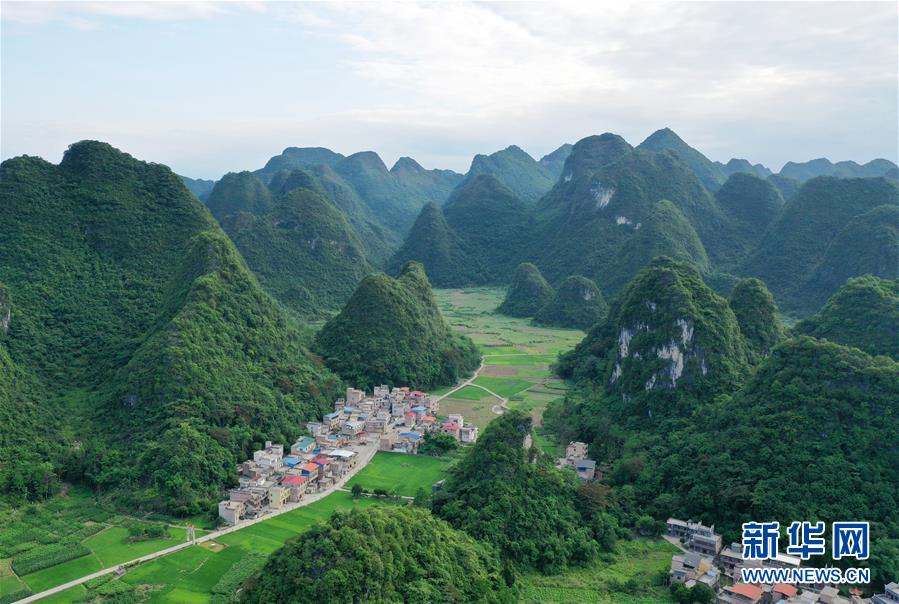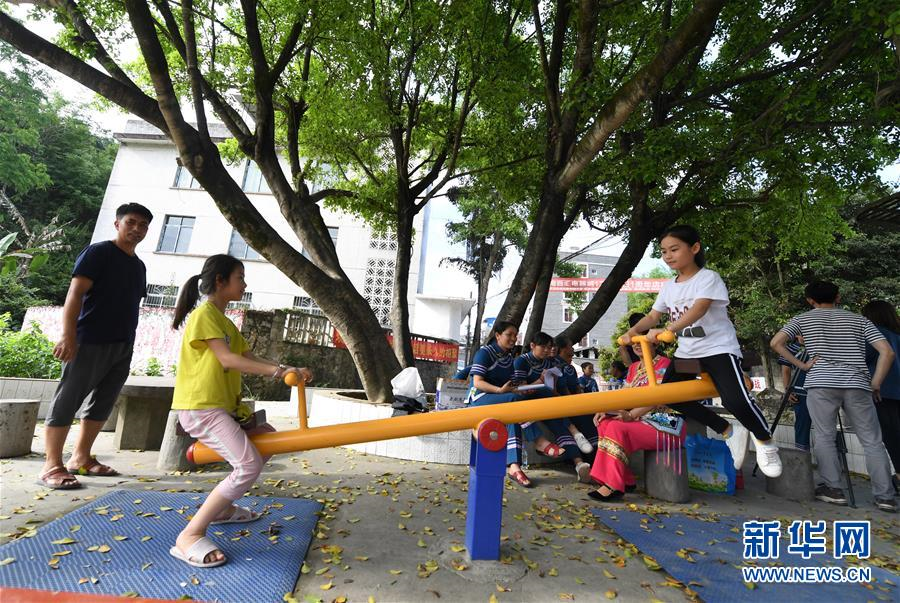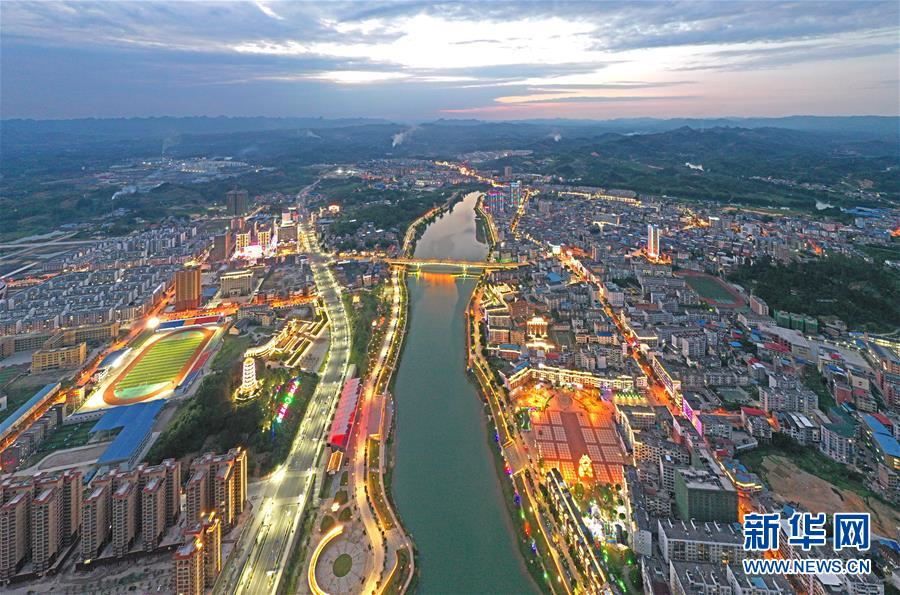Maonan ethnic group escapes from poverty
p.china.org.cn by Zhao Binyu,December 31, 2020 Adjust font size:
The Maonan people used to be referred to by a homonym that meant “suffering ethnic group” until the official name was changed to one that lacks any additional meaning in 1986 with the approval of the State Council. They have experienced dramatic changes in the course of China’s poverty alleviation campaign and the poverty reduction endeavors that have been targeted at them. The entire ethnic group ultimately emerged from poverty, and its members now live much better lives.
A rural part of Xianan township, Huanjiang Maonan autonomous county, Guangxi Zhuang autonomous region (Xinhua/Lu Anbo)
Leaving themountains
Huanjiang is the only autonomous county for ethnic Maonan citizens in China. A significant portion of the Maonan group has lived in the mountains for many generations as a result of various natural and historical developments. Helping people leave the inhospitable areas that they were living in via poverty reduction relocation and eco-migration programs was clearly the best way to help impoverished Maonan citizens improve their situations in a rapid manner.
Tan Guangtian used to live with his 91-year-old father Tan Yunri in Xiatang village, Xianan township. His mother died many years ago, and he is currently in his 50s. Tan Guangtian had to walk on rugged mountain roads for an hour and a half to catch the bus that took him to the nearest store once a month just to buy daily necessities, and his father had not left the mountains since he went to a market more than 50 years ago.
The local government helped the Tan family build a new home outside of the mountains in September 2019. More than a dozen villagers and officials took turns carrying Tan Yunri down the mountains on a chair attached to a bamboo platform the day when the father and son moved into their new home. He finally saw the outside world again after all these years and obtained his very first ID card.
The Tans currently raise three head of cattle and receive a minimum living allowance, endowment insurance, and an allowance for people who are 80 years old or older. Tan Guangtian mentioned that his new goal is to get married and give his father a daughter-in-law.
Huang Rongbiao, Party secretary of Huanjiang, explained that the county has helped 1,880 households renovate old and dilapidated homes and that 2,356 impoverished Maonan citizens have moved from inhospitable areas to two large resettlement communities and seven smaller sites in recent years, which has made it possible for them to escape from poverty. The county has also attracted 27 leading enterprises to the resettlement areas, and 102 factories and workshops that promote poverty eradication have been established. The relocated residents have been able to find jobs in their new areas and live better lives as a result of these undertakings.
Mo Guiyuan is one of the ethnic Maonan citizens who participated in a relocation program that was designed for them. She has been spending her days making school uniforms with a sewing machine in a skillful manner inside a clean garment factory that was established in order to promote poverty alleviation. The difficult years that the seamstress spent farming in the mountains have become a distant dream.
Mo used to live in a dilapidated two-story residence in Shuiyuan town’s Shangnan community with her husband, two daughters, and another relative. The family lived on the top floor of their home and kept livestock animals on the first floor. The building was drafty in the winter, and the ceiling often leaked in the summer. Mo and her husband eventually began working outside of their local area in order to make more money as their two daughters grew older, and were only able to come back home a few times a year. In 2018, Mo’s family had the opportunity to move to a resettlement site. She also found a job in the garment factory earning nearly 3,000 yuan (US$430) a month, which made it possible for her to stay in the area.
“We all cherish the fact that we are able to live such a good life now,” Mo sobbed when reflecting on her family’s new situation. Her elder daughter will graduate from university this year, and she now feels much relieved.
Two children play on a seesaw at the Xianan township’s Xianan community. (Xinhua/Lu Anbo)
Bidding farewell to hardships
Lack of easily accessible drinking water, poor transportation, and outdated or nonexistent electrical infrastructure were once the three major problems that prevented ethnic Maonan citizens from escaping from poverty.
The Maonan people mostly live in Xianan township, which suffers from long-term seasonal water shortages as a result of its location in a karst mountainous region. Impoverished Xianan community resident Qin Fengzeng now no longer needs the tanks that she used to store water in when running water was limited or even nonexistent.
Many years ago, Qin Fengzeng had to retrieve drinking water from a spring near her home every morning and store it in a small storage tank. Water infrastructure was eventually built in the township in the 1980s, but the liquid was only being available during limited intervals as a resulted of limited supply. Qin Fengzeng’s family purchased a larger second tank so they could store as much water as possible when it was available.
Qin Chunguo, Party secretary of Xianan township, recently mentioned that his colleagues told him that he needed to make sure he had a large storage tank available when he was assigned to work in the township in 2016 because the local water system only supplied water a couple hours a day. He was very upset when he discovered that teachers and students at a school in the area even had to “steal” water at times due to the severity of the problem.
Local residents and officials working in the area had been searching for new sources of water for decades but none of their ideas came to fruition. The Dagou river 12 km away from the seat of the township government was the most obvious answer, but the vast mountains in the area prevented possible diversion projects.
“It is very difficult to build roads, power lines, tunnels, and reservoirs in the mountains, but nothing can stop us from improving living conditions for the Maonan people,” Huang Rongbiao declared. In 2017, the Guangxi Zhuang government and the central government provided special funding support for a drinking water project that sourced water from the Dagou river.
Purified tap water became available to all of Xianan township’s residents on June 24, 2019. Qin Fengzeng turned on the tap in their kitchen sink, and a steady stream of clean water emerged. They no longer needed to use their storage tanks.
Many villages in Huanjiang also suffered from transportation and electricity problems in addition to inadequate water access when targeted poverty alleviation policies were implemented in 2015. A remote part of Xianan’s Jingyang village known as Shangmangtun is one of the places that lacked access to roads and electricity. Tan Rong’an was a member of an impoverished household in the area. He lived isolated from the rest of the world in the mountains for many years and lived mainly by fishing.
Tan Rong’an used to use rechargeable batteries to power the lights at his dwelling at night. He usually connected one for about a week until it died while another was charging at a friend’s or relative’s home in a nearby village and swapped the two when the one he was using ran out of juice.
An access road was extended to Shangmangtun in 2017, and the area was connected to the electric grid in 2018. Tan Rong’an was also able to move into a brand-new residence as a result of special policies related to dilapidated homes that the government implemented and began working as a janitor soon after.
The rugged roads that once existed in the area have been replaced by paved surfaces that wind through the mountainsides, and the streetlights that were installed light up the sky like stars after dusk in Maonanshan township.
Huanjiang County Head Huang Bingfeng explained that the county government invested a total of 1.2 billion yuan (US$171.8 million) in infrastructure in 72 villages inhabited by impoverished Maonan citizens and built or repaired 1,160 km of village-level roads during the current round of poverty reduction efforts. The rural electric grid was also expanded and upgraded, and every Maonan household that had lived without the utility became connected to it.
A view of the Huanjiang county seat in the evening (Xinhua/Zhou Hua)
Developing industries
Just after the beginning of the Grain Budding – the eighth of the 24 Chinese solar terms – the citrus trees in Bochuan village, Xianan township begin to bear fruit and sway in the warm breeze.
Maonanshan township’s residents have mostly engaged in rice and corn farming amidst numerous peaks and valleys in the area over the years. In 2013, an impoverished village official named Tan Meichun visited the city of Guilin to learn more about its citrus industry. She felt envious when she saw that the people who participated in it were able to live in nice homes. But Tan felt discouraged by the upfront investment that would be required if she wanted to pursue similar undertakings and the period of time that would elapse before she would profit.
Huanjiang issued a series of policies designed to support the development of industries that could employ impoverished people after a targeted poverty alleviation campaign was launched in 2015. Tan Meichun decided to lease 2.3 ha of land from fellow villagers to grow citrus fruit when she became aware of the policies. Other residents in the village became interested in participating and began devoting some of their land to Tan Meichun’s undertaking in an agreement that involved no rentals until profit was achieved.
The government began offering free seedlings, providing technical guidance and credit support, and implementing other policies to support citrus farming endeavors in the area, and the industry began to take shape in less than a year.
More and more impoverished villagers became interested in growing citrus fruit when they became aware of the industry’s potential, so Tan Meichun decided to establish a cooperative in Huanjiang’s Maonan new village. The organization currently grows citrus fruit on more than 18.6 ha of land and has 60 members, 14 of whom are impoverished. Fruit is sold online during harvest season and yields nearly 1 million yuan (US$143,170) of income to local growers.
Characteristic mulberry silkworm, fragrant pig, beef cattle, and oil-tea camellia industries have been developing and thriving in Huanjiang since 2016, and 470 specialized farmers’ cooperatives and 10 leading agricultural enterprises operating in these areas currently exist in the county. Nearly every impoverished Maonan citizen was participating in Huanjiang’s characteristic industries by the end of 2019, and Maonanshan township has become much more prosperous.
“I can sell my cattle for 4,000 yuan (US$573) per head, and the endeavor is not very labor intensive,” 50-year-old rancher Tan Jianghui explained while he ground hay that he had harvested and mixed it with corn flour one morning to make feed for his animals. The 1.3-m-tall farmer has disabilities and used to lead a very difficult life but eventually became a skilled cattle rancher, which has helped him regain confidence in life.
Tan Jianghui lives on what used to be relatively barren land in Xianan township’s Caimen village. Cattle farming was identified as a key poverty reduction industry after a new poverty eradication campaign was launched, and the local government began providing training, discounted loans, and funding for members of impoverished households. Tan Jianghui was determined to participate in the industry in order to escape from poverty, so he converted all of his family’s hilly fields into pastureland, began raising cattle, and gradually began bringing in stable income.
Tan Jianghui escaped from poverty in 2019 and is currently working on new goals. He mentioned that he will continue to engage in cattle farming and eventually move to the county seat when he becomes more prosperous.



2992c0ff-0659-4b4d-8ad4-c255e8af284c.png)